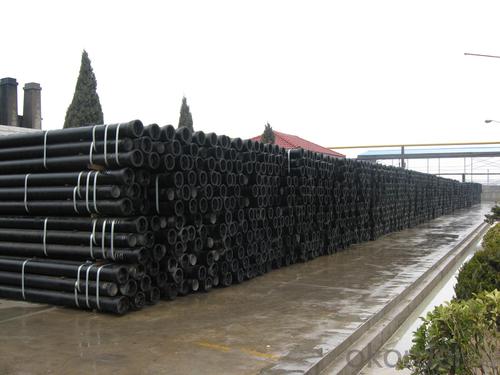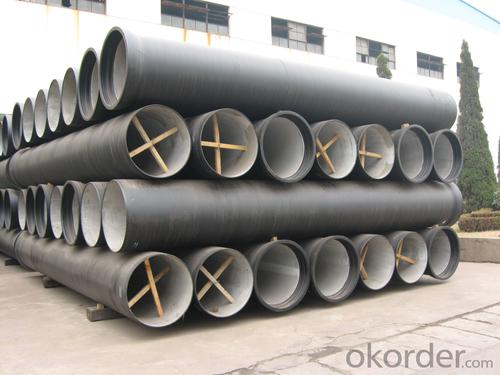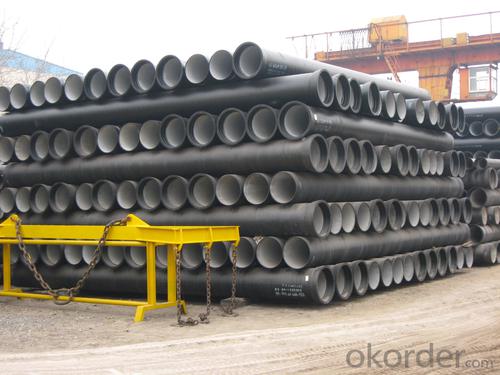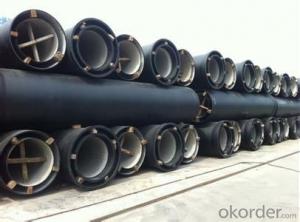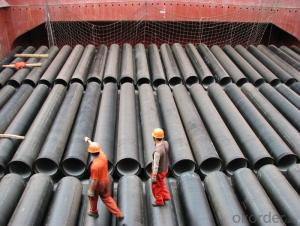DUCTILE IRON PIPE DN125K8/C/K9
- Loading Port:
- China Main Port
- Payment Terms:
- TT OR LC
- Min Order Qty:
- -
- Supply Capability:
- -
OKorder Service Pledge
OKorder Financial Service
You Might Also Like
Specification:
1) The standard of pipe: ISO2531:1998, K9
2) Effective length: 6m
3) Inner cement line: Portland cement line as per ISO4179
4) Zinc coating: at least 130g/m2 as per ISO8179
5) Bitumen painting: at least 70um as per ISO8179
6) With 100% quantity of NBR ring, or SBR ring, or EPDM ring as per ISO4633
7) DN80mm-800mm
8) High strength, lighter than grey iron, good corrosion resistance, no furring, small flow resistance, easy fixing, long life tome about 100 yeas
9) Produced by Hangzhou chunfeng machine
10) Checked by automatic inspection equipment
11) Composition:
Chemical composition | | | | |||
Chemical composition | Ductile Cast Iron Pipe (%) | Grey iron pipe (%) | Steel pipe (%) | | | |
C | 3.5-4.0 | 3.2-3.8 | 0.1-0.2 | | | |
Si | 1.9-2.6 | 1.4-2.2 | 0.15-0.4 | | | |
Mn | 0.15-0.45 | 0.4-0.6 | 0.3-0.6 | | | |
P | ≤0.06 | ≤0.3 | 0.02-0.03 | | | |
S | ≤0.02 | ≤0.1 | 0.02-0.03 | | | |
Mg | 0.03-0.06 |
|
| | | |
12) Feature:
Mechanical properties | | | | |||
| Ductile Cast Iron Pipe | Grey Iron Pipe | Steel Pipe | | | |
Tensile Strength(Mpa) | ≥420 | 150-260 | ≥400 | | | |
Yield Strength(Mpa) | ≥300 | No Confirmation | No Confirmation | | | |
Bending Strength(Mpa) | ≥590 | 200-360 | ≥400 | | | |
Elongation (%) | ≥10 | Neglected | ≥18 | | | |
Brinell Hardness(HBS) | ≤230 | ≤230 | About 140 | | | |
13) T type mechanical joint
14) Packing: in bulk or container
- Q: Are ductile iron pipes resistant to external loads?
- Generally, external loads pose little challenge to ductile iron pipes. Ductile iron, a variant of cast iron, undergoes treatment with magnesium and cerium additives to enhance its flexibility and durability. As a result, these pipes possess the ability to endure substantial external pressure and stress without succumbing to cracks or fractures. Ductile iron pipes find extensive implementation in scenarios where heavy loads are anticipated, including underground water distribution systems, sewer lines, and industrial pipelines. Their exceptional resistance to external loads has been thoroughly validated, establishing them as a dependable option for diverse infrastructure ventures.
- Q: What is the expected thermal expansion of ductile iron pipes?
- Several factors, including the iron's composition, temperature range, and pipe length, can affect the expected thermal expansion of ductile iron pipes. Generally, these pipes have a coefficient of thermal expansion between 10 and 13 µin/in/°F. This implies that for every one degree Fahrenheit rise in temperature, the ductile iron pipe will expand by around 10 to 13 microinches per inch in length. It is worth mentioning that this estimation is approximate and may slightly differ based on the pipe's specific conditions and characteristics.
- Q: Can ductile iron pipes be used in areas with high soil settlement?
- Ductile iron pipes are suitable for areas with high soil settlement due to their strength and durability. They can withstand external loads and ground movement, making them an ideal choice for such areas. Additionally, these pipes have a high resistance to corrosion, making them even more suitable for use in areas with high soil settlement. However, it is important to consider factors such as proper installation techniques, appropriate bedding and backfill materials, and regular maintenance to ensure the longevity and performance of the ductile iron pipes in these areas. Consulting with a qualified engineer or pipe manufacturer can provide more specific guidance based on the site's conditions and requirements.
- Q: How are ductile iron pipes tested for hydrostatic pressure?
- For water and wastewater applications, ductile iron pipes are widely used because of their strength and durability. To guarantee their quality and dependability, these pipes undergo hydrostatic pressure testing. The process of hydrostatic pressure testing involves applying internal pressure on the ductile iron pipes at levels higher than their normal operating pressure. This is done to evaluate their ability to withstand the maximum pressure they may encounter during their service life. To begin the testing, a sample set of pipes is carefully selected from a production batch or shipment. These samples are meticulously prepared by removing any surface coatings or debris that could affect the accuracy of the test results. The prepared samples are then placed in a specially designed test rig or test line. The test rig is equipped with all the necessary connections, valves, and gauges to accurately control and monitor the test conditions. Once the samples are secured in the test rig, water or another suitable test fluid is slowly introduced into the pipes. The pressure is gradually increased to a preset level, typically surpassing the expected operating pressure by a certain factor. This elevated pressure is maintained for a specified duration, usually several hours, to evaluate the structural integrity and leak resistance of the pipes. Throughout the test, the pipes are closely monitored for any signs of leakage, deformation, or failure. Skilled technicians or engineers observe the pressure gauges and visually inspect the pipes for any visible defects or abnormalities. Additionally, automated systems may be used to continuously record and analyze the pressure readings, ensuring accurate data collection. After the specified test duration, the pressure is gradually released, and the pipes are meticulously inspected for any permanent deformation or residual stress. This inspection may involve visual examination, dimensional measurements, or non-destructive testing techniques like ultrasonic testing or magnetic particle inspection. The test results are then assessed against the relevant industry standards or specifications to determine if the pipes comply with safety and performance requirements. If the pipes pass the hydrostatic pressure test, they are considered suitable for their intended application. However, if any issues or failures are identified, further investigation, analysis, or corrective actions may be necessary before the pipes can be approved for use. In conclusion, hydrostatic pressure testing plays a vital role in ensuring the quality and reliability of ductile iron pipes. By subjecting these pipes to rigorous testing procedures, manufacturers can provide customers with pipes that meet the highest standards of safety and performance.
- Q: What is the weight of ductile iron pipes?
- The weight of ductile iron pipes can vary depending on their size, thickness, and length. Typically, ductile iron pipes can range from a few pounds to several hundred pounds per linear foot.
- Q: How does ductile iron pipe perform in sandy or unstable soils?
- Due to its inherent strength and flexibility, ductile iron pipe exhibits exceptional performance in sandy or unstable soils. Its composition, which includes a combination of iron, carbon, and small amounts of other elements, grants it superior mechanical properties compared to other pipe types. In sandy soils, where the ground may shift and cause pipe movement and deformation, ductile iron's high tensile strength and elongation characteristics enable it to withstand pressure and stress without fracturing or breaking. Its flexibility allows it to accommodate soil movement and settlement, reducing the risk of pipe failure. Furthermore, ductile iron pipe's resistance to corrosion makes it highly suitable for installation in sandy soils. The application of protective linings and coatings on both the interior and exterior of the pipe prevents corrosive elements in the soil from attacking the iron, ensuring durability and reliability in the long term. In unstable soils with varying compaction levels or weak load-bearing capacity, ductile iron pipe's sturdy construction provides stability and support. Its robustness allows for even distribution of loads, minimizing the chances of pipe deflection or collapse. Moreover, the joint design and sealing methods of ductile iron pipe, such as push-on joints or mechanical joints with rubber gaskets, offer excellent leak resistance and prevent soil infiltration. This further enhances its performance in sandy or unstable soils. Overall, the combination of strength, flexibility, corrosion resistance, and reliable joint systems makes ductile iron pipe an ideal choice for applications in sandy or unstable soils. It provides a long-lasting and efficient solution for the transmission of water and wastewater.
- Q: What is the external coating used in ductile iron pipes?
- Ductile iron pipes usually have an external coating made of protective materials like zinc or asphalt. These coatings are applied to the pipe's surface to prevent corrosion and shield the iron from its surroundings. Zinc coatings, like hot-dip galvanizing, are widely employed because of their exceptional resistance to corrosion. Conversely, asphalt coatings offer a resilient and adaptable shield against corrosion and abrasion. The selection of the coating relies on factors such as the intended use, environmental circumstances, and project-specific requirements.
- Q: Method for cutting large diameter ductile iron pipe
- When the oxygen and acetylene volume ratio is greater than 1.2, is formed. As more oxygen, burning, the flame length is shortened obviously, cone tapered inner flame almost disappeared, and a strong desire. Making due to oxygen, the oxidation of metal, so are not widely used, only used for welding of brass, to prevent evaporation of zinc.
- Q: How much pressure can the ductile iron pipe socket meet?
- After all, he is not steel, strength is low, toughness is poor. But a short period of about 100kg, things should be no problem.
- Q: Can ductile iron pipes be used for underground cooling water systems?
- Ductile iron pipes are suitable for underground cooling water systems. They are renowned for their durability, strength, and resistance to corrosion, making them ideal for various applications, including underground installations. In cooling water systems, where pipes encounter water and potentially harsh environments, ductile iron pipes offer a dependable and enduring solution. Their capacity to withstand high pressure and temperature variations also guarantees the efficient and secure operation of the cooling water system. Moreover, ductile iron pipes are frequently favored for underground installations because they are easy to install, require minimal maintenance, and are cost-effective.
Send your message to us
DUCTILE IRON PIPE DN125K8/C/K9
- Loading Port:
- China Main Port
- Payment Terms:
- TT OR LC
- Min Order Qty:
- -
- Supply Capability:
- -
OKorder Service Pledge
OKorder Financial Service
Similar products
Hot products
Hot Searches
Related keywords



